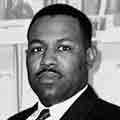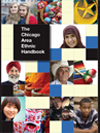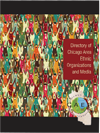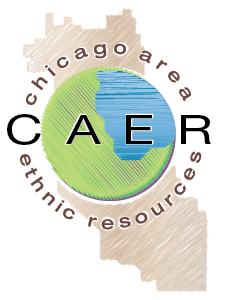-
Where are all the people?
By Derrick K. Baker

After more than three decades of calling Chicago home (save four years in Iowa at college), Iʼve become totally enamored with, and publicly proud of, the nationʼs third largest city. It is gorgeous, historic, vibrant, cultural, diverse and wealthy. If youʼre going to reside in one of the major cities, Chicago is a good choice.
Iʼve also reached the point where living in the Windy City finds me both excited and depressed, optimistic and pessimistic, successful and stonewalled, clearheaded and confused, lauded and ignored, open-minded and opinionated, benevolent and selfish. Iʼm as brave as a lion on the outside, while the timidity of a sheep lurks within. For me, life in the Windy City is akin to looking at glass of water and constantly trying to decide if itʼs half empty or half full.
Why? Chicago and the 2.8 million who live here can create such confusion, especially if you look like me: a 34-year-old African American man. Thatʼs because for my race and gender, this city — like other urban metropolises — can disguise itself as your oyster, but the shell sometimes slams shut as you extend your hand to sample the dish.
Case in point: Several years ago while attending a job fair that featured major corporations and mid-size businesses specifically in search of talented minorities, my resume traveled among almost two dozen corporate recruiters faster than a feather in a windstorm. More than a few of the “suits” openly gushed over my life-on-a-page and lauded my potential. All of which left me naively optimistic. But not a single company offered me a follow-up interview. Most werenʼt merciful enough to send even the tersest rejection letter.
Or consider the cityʼs bustling yet contradictory night life, which successfully beckons you to Rush Street. But when youʼre a young African American man barhopping with two white female friends, what you get is an unforgettable lesson in Facism 101, or a humiliating lesson in what happens when you canʼt produce three picture IDs, when everyone else gets in by flashing a driverʼs license.
But Chicago also has offered me — a black man with dreams, goals, and a burning desire to see people do the right things at the right time for the right reasons — the opportunity to excel, meet literally thousands of people from all walks of life, and find a certain level of happiness.
And in what some might see as a form of reverse racism, Chicago continues to appeal to me because virtually everywhere I venture, I see African Americans. All shapes, colors and sizes. All socio-economic backgrounds. Married and single. Driving, biking, rollerblading, on public transportation and walking. In Water Tower Place. In the Harold Washington Library. In the express line at Jewel. In the dressing room at Marshall Fieldʼs. In the concession-stand line at the Fine Arts Theatre. In nightclubs on the North Side and restaurants on the South Side. Even in Bridgeport.
Whatʼs comforting about “seeing yourself” everywhere you go? The same feeling of inner peace and camaraderie that comforts people of any ethnic group who live in a city, village or neighborhood thatʼs populated with a respectable percentage of their own. There always are people to whom you can relate, and to whom you can freely reveal a part of yourself that might be frowned upon or misunderstood by the mainstream.
I find comfort in knowing there are more than a million African Americans in Chicago. Itʼs like putting an ice cube on the sidewalk in July and watching it not melt. Given this cityʼs documented history of institutional and overt racism toward African Americans, we nevertheless have excelled and continue to tangibly contribute to Chicagoʼs march toward the next century.
Consider that Harold Washington, Chicagoʼs first black mayor, quickly gained national prominence after his election. Consider that Michael Jordan “owns” the world.
To be African American in Chicago means being profoundly proud of the beauty, history and tranquility of upscale Beverly, Pill Hill and Chatham, especially when such neighborhoods are in a city whose first settler was one of your own.
Despite the first word in the latest moniker bestowed upon African Americans, my strongest allegiance is to the United States, even with all its warts. The combination of my never having traveled to Africa (though I hope to some day), coupled with my parentsʼ and relativesʼ never really speaking of our genealogical connection to the Motherland, has made me relatively ignorant of key facts about our ancestorsʼ birthplace. That, of course, is not to disparage the rich, majestic heritage of Africa. Itʼs simply that, like millions of other African Americans born and raised in this country, being reared in the richest, strongest and most industrialized land of opportunity necessarily directs your focus to your own birthplace.
My parents were born and raised in small towns in Mississippi. So were their brothers and sisters, and their parents. Iʼve traveled South by car on Interstates 57 and 55 dozens of times to visit that state, which has fewer people than the city of Chicago. My parentsʼ connections to Mississippi still run deep — as do mine — and I have the utmost respect for Mississippians. But history tells us that hundreds of thousands of African Americans migrated to Chicago, which prompts me to ask, “What were they looking for in the North?” The same employment, economic and cultural opportunities I would have sought. Did my parents find a pot of gold at the end of the rainbow? Sometimes I think yes; on other occasions, no. It depends on when you ask them.
Have I found gold at the end of the rainbow Iʼve been chasing for 31/2 decades? My answer also depends on when you ask me. But I do know this: The city of Chicago has shaped the quality and direction of my life as much as have my family and friends.
Derrick K. Baker is a contributing editor for NʼDIGO, where he writes a bi-weekly column titled, “The Way I See It.”
Return to Links & Features
Available Now!
The
Chicago Area Ethnic
HandbookEasy-to-use chapters on the histories and traditions of
37 ethnic groups.
Second Edition
UPDATED and EXPANDED!

The Directory
of Chicago Area Ethnic Organizations
and Media Who they are, what they do and how to reach them.
Third Edition



